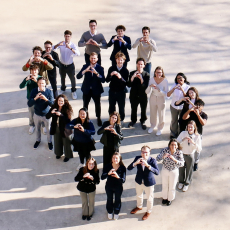The survey of 4,206 professionals from 75 countries reveals that in 3 years, Environmental challenges have significantly overtaken rapid technological advancement as the biggest global business threat. In 2018, 23% of professionals rated environmental concerns among the top challenges facing business leaders in the 21st century, behind technology (28%).
However, a survey conducted in September 2021 shows that a massive 43% of professionals now believe that the environment will be among the greatest challenges, with technology falling far behind in second (27%). Both are still considered far greater challenges to global business than shifts in world economic and political power centres (14%), political instability (6%) and even global pandemics (3%).
A staggering shift
Professor Lars Strannegard, Deputy Chair of the CEMS Global Alliance President of the Stockholm School of Economics, said:
“Our new figures reveal a staggering shift in the numbers of professionals around the world who see the unfolding environmental emergency, including the impending climate disaster, as the biggest challenge international business leaders will need to tackle in the 21st century.
“Three years ago the rapid rate of technological advancement was the key concern for respondents, however the new findings indicate that people are no longer as frightened of technological progress as they once were. This may reflect the fact that the COVID-19 pandemic accelerated and mainstreamed digitisation within just a few months. Professionals have fully embraced digital ways of working because there has been no other way.”
Working together for the survival of the planet
CEMS carried out the research among 4,206 of their alumni based in 75 countries around the world*, the majority of whom are in professional roles, with many in senior management positions.
Lars Strannegard added:
“There is no doubt this is a unique period in world history, which requires exceptional leaders, who can collectively come up with innovative solutions to tackle the impending climate emergency. As the COP26 conference rapidly approaches, our research adds weight to the need for collective action from business and governments on the environment right now, before it is too late.”
“All parties must work together for the survival of the planet. Through CEMS we are dedicated to preparing future leaders who are equipped with not only the passion and knowledge needed to tackle environmental challenges, but also the skills required to transform organisations from the inside out,” he said.
“Across the globe we see our graduates – many of whom took part in this research - carrying their commitment to the environment and sustainability from the classroom into the business world, as transformative leaders and entrepreneurs.”
Tackling climate change through global business education
The CEMS Business and the Environment faculty group, open to all CEMS member schools, was founded in the mid-90s with the aim of researching and teaching the managerial implications of the relationship between business and the natural environment.
Members are grounded in a broad variety of disciplinary fields (including management and economics, chemistry, biology, mathematics), which has allowed them to develop and implement new way to introduce environmental issues into mainstream business education.
Out of this faculty group has emerged innovative initiatives such as the Model UNFCCC simulation, the culmination of a semester long programme on climate policy which takes place at CEMS schools across Europe. Now in its 13th year, MIM from 30 nationalities came together online in May for the 2021 simulation.
During the event students are assigned roles which mirror those participating in the actual negotiations and work to obtain a consensus around ambitious strategies to implement the global objective of maintaining climate change below 2 degrees.
ENDS
For more information or interviews, please contact Rebecca Griffiths or Judith Hunt at GriffithsHuntPR, email media@griffithshuntpr.com
About CEMS
CEMS is a Global Alliance of leading business schools, multinational companies and non-profits that together offer the CEMS Master in International Management (CEMS MIM). The CEMS MIM is a one-year, pre-experience programme that offers students the opportunity to be educated in a truly multicultural classroom.
Students enrolled in the programme study for one semester at their home university, with a term abroad in a different CEMS member school. In addition to completing a home degree, students complete a consulting project and an international internship. CEMS alumni careers take a truly international path:
- 98% are employed or continuing their studies
- 93% have worked outside of their home country
- 65% work for multinational companies
*Research was conducted in September 2021




